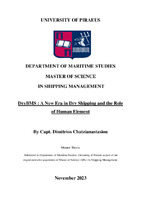DRYBMS : μία νέα εποχή στη ναυτιλία ξηρού φορτίου και ο ρόλος του ανθρώπινου στοιχείου
DRYBMS : a new era in dry shipping and the role of human element

Master Thesis
Συγγραφέας
Chatzianastasiou, Dimitrios
Χατζηαναστασίου, Δημήτριος
Ημερομηνία
2023-11Επιβλέπων
Pantouvakis, AngelosΠαντουβάκης, Άγγελος
Προβολή/
Λέξεις κλειδιά
DRYBMS ; Crew ; Management ; Human resources ; Dry shippingΠερίληψη
The objective of this study was to examine the perspectives of shipping industry employees regarding the DryBMS, focusing on both the implementation obstacles and the associated benefits. Furthermore, an examination was conducted to determine the potential influence of individuals' present positions within the dry shipping sector on their perspectives regarding the future significance of DryBMS. Finally, the study centered on examining the impact of the training provided by organizations in DryBMS on employees' perceptions regarding the primary advantages and challenges associated with the deployment of DryBMS. The study undertaken involved a quantitative research approach, focusing on a sample of 120 participants employed within the shipping business. Based on the findings, it is evident that ship owners and operators tend to hold the perspective that the DryBMS business will exhibit a reasonably stable trajectory in the future. Conversely, ship managers exhibit a greater inclination towards the belief that the sector would witness a broader adoption. The majority of crew members, marine regulators, and individuals who identify their function in the shipping industry as "Other" express their support for the notion that the DryBMS will undergo further development in order to effectively tackle emerging difficulties in the future. In the meanwhile, a prevailing viewpoint among port authorities is that DryBMS is poised to undergo further development in order to effectively tackle emerging difficulties, or alternatively, it may experience a diminished level of relevance. In relation to the second research question, it appears that participants who got training and instruction from their respective organizations regarding the DryBMS predominantly hold the belief that its adoption has enhanced efficiency while encountering challenges stemming from resistance to change. Regarding those who did not undergo DryBMS training provided by their respective organizations, a significant majority of them express the belief that the introduction of DryBMS has resulted in a decline in safety standards and has encountered additional obstacles beyond those outlined in the research.


